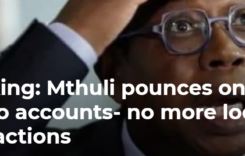CLAIM: South African retailer Massmart, which this week announced plans to cut jobs and close some stores, is facing currency problems in African markets such as Zimbabwe.
VERDICT: Incorrect. Massmart has no operations in Zimbabwe. The retailer closed its two Makro stores in Zimbabwe in 2011
A January 13, 2020, report by Reuters on South Africa’s MassMart linked the business’ struggles to Zimbabwe.
“A number of Massmart’s rivals, such as Shoprite, are also struggling in the difficult market conditions, and both retailers have also had to battle currency weakness elsewhere in Africa, especially Zimbabwe and Nigeria,” the report on www.af.reuters.com said.
Commentary on a video posted on the @ReutersBiz Twitter account said:
“Massmart is also battling currency weakness in other African markets, particularly Zimbabwe and Nigeria.”
South Africa’s Massmart is looking to axe up to 1,440 jobs under a plan to close some stores as low growth, high unemployment and a rising cost of living hurt South Africans’ spending power https://t.co/thvUN7VRio pic.twitter.com/3OenCYQOki— Reuters Business (@ReutersBiz) January 14, 2020
Massmart operates in 13 African countries, but Zimbabwe is not one of them
Massmart is majority owned by US retail giant Walmart, which bought the South African business in 2011.
At the time, Massmart used to have two Makro stores in Zimbabwe, in Harare and Bulawayo. However, soon after the WalMart takeover, Massmart closed the two stores.
In 2011, Reuters quoted Massmart’s then chief executive officer Grant Pattison saying the company was pulling out of Zimbabwe because of the country’s local ownership laws, which have since been scrapped for most sectors.
“It was sad, but indigenisation law effectively says foreigners are not welcome in Zimbabwe,” Massmart’s CEO Grant Pattison said then at the company’s results presentation.
Conclusion: Massmart has no operations in Zimbabwe, having closed its two stores there in 2011. It is incorrect to link the company’s current problems to Zimbabwe’s currency struggles.
Do you want to use our content? Click Here












